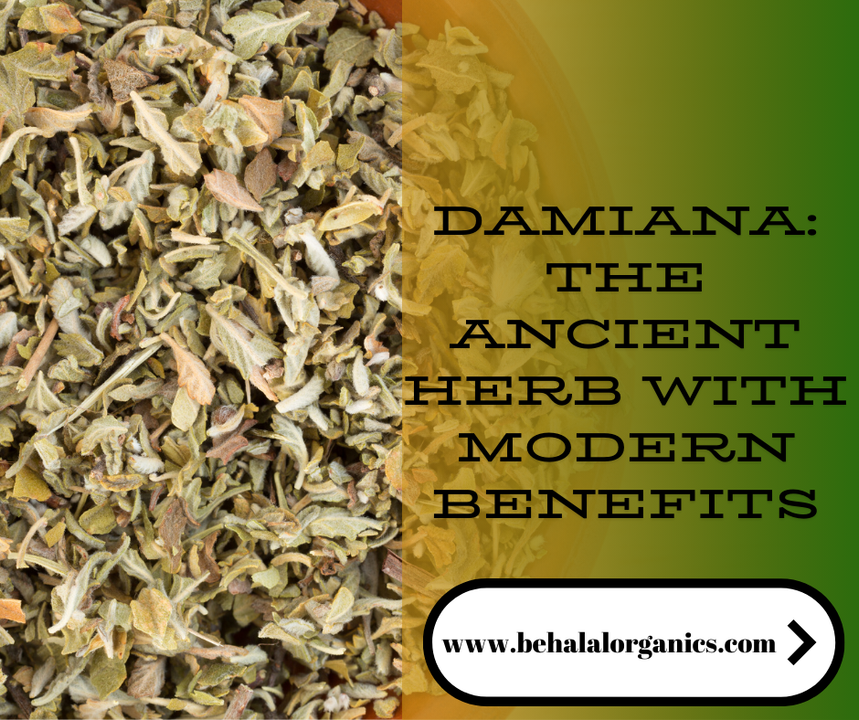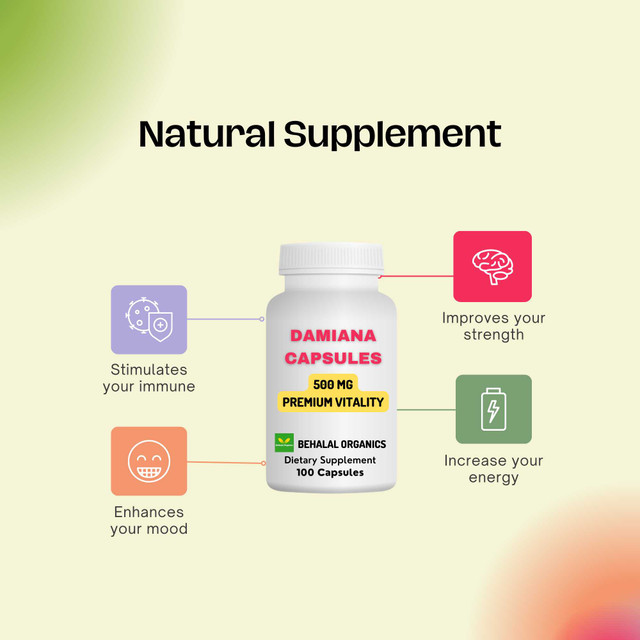Damiana: The Ancient Herb with Modern Benefits
Introduction to Damiana
Damiana, an ancient herbal remedy that has stood the test of time, is gaining popularity in modern wellness circles for its remarkable health benefits. Known for its role in enhancing libido, supporting mental health, and more, Damiana is a herb you don't want to overlook if you're exploring natural supplements. But what exactly is Damiana, and how can it benefit you? Let's dive deep into this fascinating plant and uncover its rich history and practical uses.
The History of Damiana
Traditional Uses of Damiana in Ancient Cultures
Damiana (Turnera diffusa) has been used for centuries by indigenous cultures in Mexico, Central, and South America. It was particularly popular among the ancient Mayans, who used it as an aphrodisiac, mood enhancer, and general tonic. Traditional healers often prescribed Damiana to improve sexual function, treat bladder infections, and alleviate symptoms of depression.
The Importance of Damiana in Herbal Medicine
As herbal medicine spread worldwide, so did the knowledge of Damiana’s potential. The herb was adopted into Western herbalism in the 19th century, mainly for its reputed aphrodisiac properties. Over time, practitioners began to realize the broader benefits of Damiana, making it a staple in alternative medicine today.
Understanding What Damiana Is
Botanical Classification of Damiana
Damiana is a small shrub that belongs to the Passifloraceae family. Its yellow flowers and aromatic leaves are the parts most commonly used in herbal preparations. The leaves, in particular, contain the powerful compounds responsible for Damiana’s health benefits.
Where Damiana Is Found: Geography and Growing Conditions
Damiana thrives in hot, dry climates. It is native to areas like southern Texas, Mexico, Central America, and the Caribbean. The shrub grows in rocky, well-drained soils and can tolerate drought, making it a resilient plant that can survive in harsh environments.
The Chemical Composition of Damiana
Active Compounds in Damiana
Damiana contains several active compounds, including flavonoids, terpenoids, and alkaloids, which contribute to its medicinal properties. The herb is also rich in antioxidants, which help protect the body from oxidative stress.
How These Compounds Affect the Human Body
The flavonoids and alkaloids in Damiana are believed to be responsible for its calming effects on the nervous system, making it an excellent choice for reducing anxiety and stress. Terpenoids, on the other hand, have aphrodisiac and mood-enhancing properties, which explain Damiana’s traditional use for boosting libido.
Health Benefits of Damiana
Enhancing Libido and Sexual Health
One of the most well-known benefits of Damiana is its ability to enhance libido and sexual function. Both men and women have used Damiana to increase desire and improve sexual satisfaction. This herb works by stimulating blood flow and increasing sensitivity in erogenous zones, making it a natural choice for anyone looking to boost their sexual health.
Supporting Mental Health and Reducing Anxiety
In addition to its libido-boosting properties, Damiana is known for its ability to support mental well-being. The herb has mild sedative effects, which can help reduce anxiety, promote relaxation, and improve mood. Many people find that Damiana helps them cope with stress and emotional fatigue.
Digestive Benefits of Damiana
Damiana isn’t just good for your mind and libido – it’s also beneficial for your digestive health. Traditionally, it has been used to relieve constipation and improve digestive function. The plant's compounds work to tone the digestive tract, promoting regularity and reducing bloating.
Antioxidant Properties
Like many herbs, Damiana is packed with antioxidants, which help fight off free radicals in the body. This can contribute to overall health and longevity, protecting the cells from damage and reducing the risk of chronic diseases.
How Damiana Is Used Today
Different Forms of Damiana Supplements
In today’s market, you can find Damiana in several forms, including dried leaves for tea, capsules, tinctures, and extracts. Each form offers different benefits, depending on your preferences and health goals.
Teas, Capsules, and Extracts: How to Choose
Choosing the right form of Damiana depends on how you want to incorporate it into your routine. Tea is great for a soothing, calming experience, while capsules offer a convenient way to ensure you're getting a consistent dose. Tinctures and extracts are highly concentrated, making them ideal for people looking for fast results.
Potential Side Effects and Precautions
Safe Usage and Dosages
While Damiana is generally safe for most people, it’s important to use it in moderation. The typical dose ranges from 2 to 4 grams of dried leaves daily, or the equivalent in capsules or extracts. Overuse can lead to mild side effects like headaches, dizziness, or insomnia.
Who Should Avoid Using Damiana
Pregnant and breastfeeding women should avoid Damiana, as there isn’t enough evidence to ensure its safety for these groups. People with certain medical conditions, such as diabetes or kidney problems, should consult a healthcare provider before using Damiana.
Damiana in Modern Herbal Medicine
How Practitioners Recommend Damiana Today
Today, herbalists recommend Damiana for a range of issues, from sexual health and libido enhancement to stress relief and digestive health. It’s often used in combination with other herbs like ginseng or maca to create powerful herbal remedies for overall wellness.
How to Incorporate Damiana into Your Wellness Routine
Recipes and Simple Home Remedies Using Damiana
One of the easiest ways to enjoy Damiana is by brewing a tea. Simply steep 1-2 teaspoons of dried Damiana leaves in hot water for 10 minutes. You can also create your own tincture by soaking the leaves in alcohol for several weeks.
Daily Dosage Recommendations
For general health, it’s recommended to take 200-400 mg of Damiana extract daily or 2-4 grams of the dried herb in tea form. Always start with a lower dose and increase gradually as needed.
Conclusion
Damiana is an ancient herb that offers a host of modern-day health benefits. Whether you're looking to enhance your libido, support your mental health, or improve your digestion, Damiana can be a great addition to your wellness routine. As with any supplement, it's essential to use it wisely and consult a healthcare professional if you have any concerns.
FAQs About Damiana
Is Damiana safe for long-term use?
Yes, Damiana is generally safe for long-term use, but it's important to follow recommended dosages and consult with a healthcare provider if you plan on using it regularly.
Can Damiana help with stress and anxiety?
Yes, Damiana is known for its calming effects and can help reduce anxiety and stress when used appropriately.
How quickly can I expect to see benefits from Damiana?
The effects of Damiana can vary depending on the individual. Some people report feeling benefits within a few days, while others may need to take it for a few weeks.
Can I combine Damiana with other herbal supplements?
Yes, Damiana can be combined with other herbs like ginseng or maca for enhanced effects, but it's important to consult a professional to avoid potential interactions.
Is Damiana safe during pregnancy?
No, pregnant or breastfeeding women should avoid using Damiana as there isn't enough evidence to confirm its safety during this time.
Legal Disclaimer :
This Statements has not been evaluated by the FDA. This product is not intended to diagnose, treat, cure, or prevent any disease or health condition.
Explore Popular Articles
-
The Ultimate Guide to Strawberry Irish Sea Moss: Benefits, Nutrition, and How to Use It Daily
3rd Mar 2026What Is Strawberry Irish Sea Moss? If you’ve been anywhere near the wellness world lately, you’ve pr
-
The Antioxidant Power of Gorontula Honey
27th Feb 2026Introduction to Gorontula Honey Have you ever wondered why some natural remedies stand the test of t
-
Why You Should Choose Authentic Ajwa from Al Madinah
26th Feb 2026Ajwa isn’t just another date fruit sitting quietly on a shelf. It’s special. It carries history, spi





